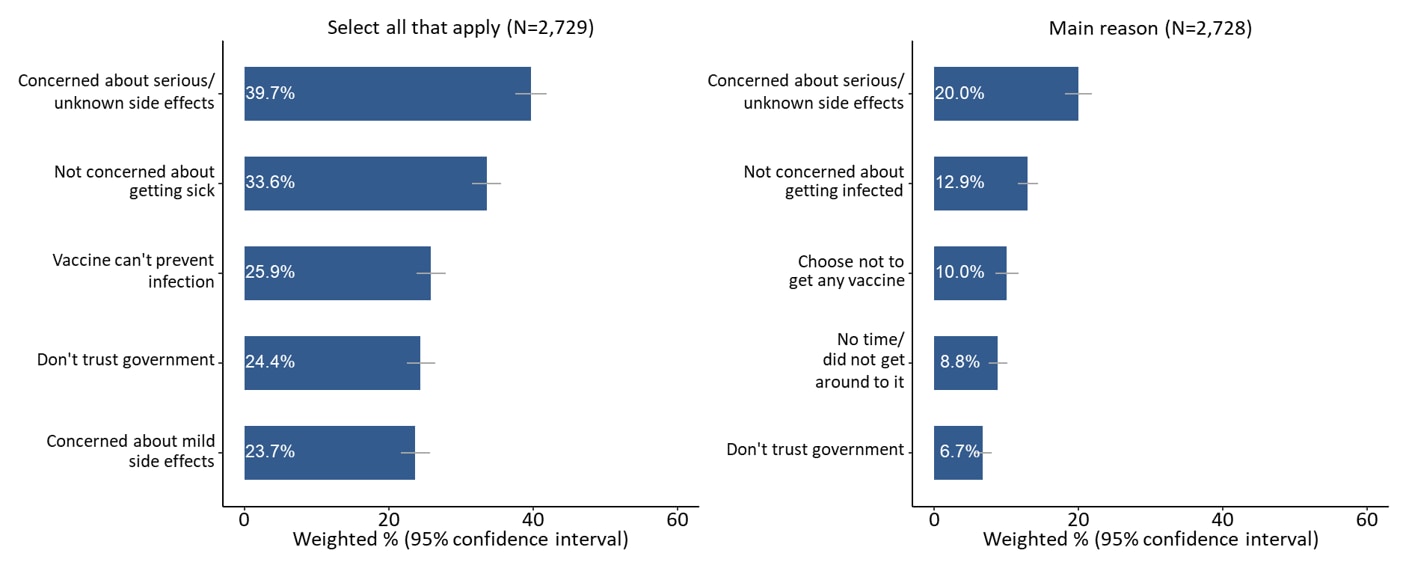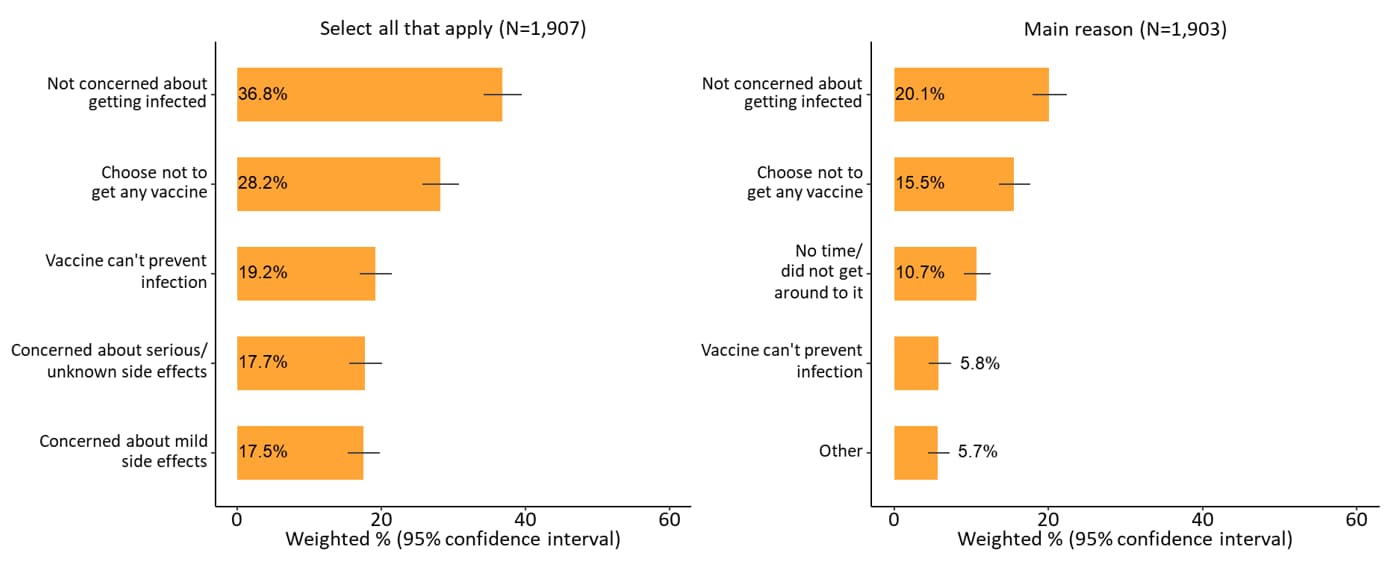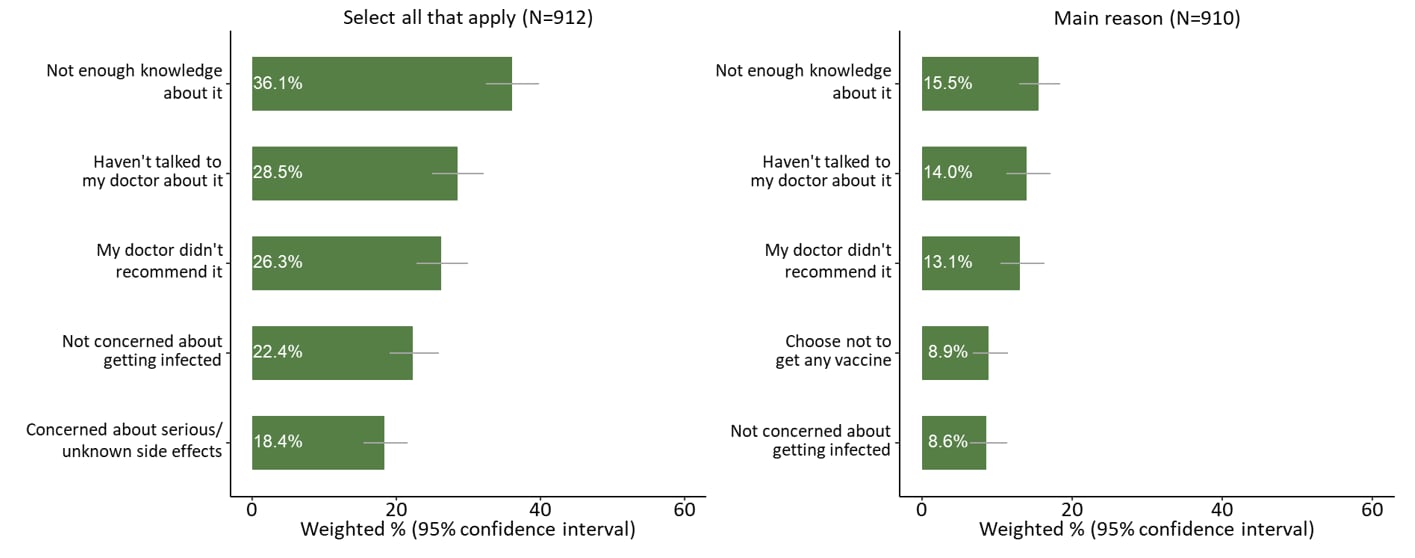At a glance
A national CDC survey of adults during June–July 2024 found that the most common reasons for non-vaccination during the 2023–24 respiratory virus season were concern about serious and unknown side effects for COVID-19 vaccine (40%) and lack of concern about getting sick for flu vaccine (37%) among adults aged ≥18 years, and lack of knowledge for RSV vaccine (36%) among adults aged ≥60 years.
Summary
The 2023–24 respiratory virus season marked the first time vaccines for COVID-19, influenza (flu), and respiratory syncytial virus (RSV) were available simultaneously. However, vaccination coverage among U.S. adults by the end of the 2023–24 season was not optimal (COVID-19: 22.9% of adults ≥18 years; flu: 44.9% of adults ≥18 years; RSV: 23.6% of adults aged ≥60 years)123. The objective of this report is to assess reasons for non-vaccination, overall and by demographic characteristics, among U.S. adults aged ≥18 years (aged ≥60 years for RSV).
CDC analyzed survey data collected from two probability-based panels during June 7–July 1, 2024. Among adults unvaccinated for COVID-19, the most commonly reported reasons for non-vaccination were concern about serious and unknown side effects of vaccination and lack of concern about getting sick. Lack of concern about getting sick was also one of the most commonly reported reasons for non-vaccination with flu vaccine, along with choosing not to get any vaccines. While these reasons were also frequently reported for non-vaccination with RSV vaccine, the most commonly reported reasons for non-vaccination with RSV vaccine were not enough knowledge about RSV or the vaccine and lack of provider recommendation. For all three vaccines, the most commonly reported reasons were largely consistent by age group, race and ethnicity, urbanicity, and insurance status.
Raising awareness of availability and benefits of the RSV vaccine for older adults, messaging about the value of all three vaccines regarding their ability to reduce illness severity, and also providing reassurances about the safety of COVID-19 vaccines in particular, could improve uptake during the 2024–25 season.
Methods
Data for this analysis were collected through the Ipsos KnowledgePanel Aand NORC AmeriSpeak BOmnibus Surveys. CDC uses these surveys for rapid data collection on receipt, intent, knowledge, attitudes, beliefs, and behaviors (KABB) related to COVID-19, flu, and other routine vaccinations. Ipsos and NORC use probability-based panels to survey a nationally representative sample of U.S. adults aged ≥18 years. Panel members complete the surveys online. Samples are drawn using an address-based sampling methodology, and data are weighted to represent the non-institutionalized U.S. population and mitigate possible non-response bias. Each month, CDC funds twenty questions, in addition to demographic variables, to be fielded on two survey waves for each panel, for a total of four survey waves. A representative sample is selected for each general adult population survey wave from the respective panels. For surveys fielded June 7–July 1, 2024, there were 4,082 total respondents across the four waves.
Adults aged ≥18 years who did not receive a 2023–24 COVID-19 vaccine were asked, "Which of the following are reasons why you did not get a 2023–24 COVID-19 vaccine? Please select ALL that apply." Respondents who selected more than one reason were then asked, "Among the reasons you selected for why you did not get a 2023–24 COVID-19 vaccine, what is the MAIN reason?" Adults aged ≥18 years who did not receive a 2023–24 flu vaccine and those aged ≥60 years who had not yet received an RSV vaccine were asked similar questions. See Appendix for full list of questions and response options.
A total of 2,729 adults aged ≥18 years who reported they had not gotten a COVID-19 vaccine since September 14, 2023 (or ever), were included in the analysis for COVID-19 vaccination; 1,907 adults aged ≥18 years who reported they had not gotten a flu vaccine since July 1, 2023, were included for flu vaccination; and 912 adults aged ≥60 years who reported they had not gotten an RSV vaccine were included for RSV vaccination.
Throughout this report, differences among groups were assessed using t-tests with p-values <0.05 considered statistically significant. This activity was reviewed by the CDC and was conducted consistent with applicable federal law and CDC policy (45 C.F.R. part 46.102(l)(2), 21 C.F.R. part 56; 42 U.S.C. Sect. 241(d); 5 U.S.C. Sect. 552a; 44 U.S.C. Sect. 3501 et seq).
Results
Reasons for not getting a 2023–24 COVID-19 vaccine
- Overall, among adults aged ≥18 years who did not get a 2023–24 COVID-19 vaccine, the most commonly reported reasons for not getting one were: concern about serious/unknown side effects (39.7%), lack of concern about getting sick (33.6%), belief that the vaccine can't prevent infection (25.9%), not trusting the government (24.4%), and concern about mild side effects (23.7%) (Figure 1).
- When asked to select one main reason, the most commonly selected was concern about serious/unknown side effects (20%).
- While not one of the most common reasons overall, not having time / not getting around to it was among the five most commonly selected main reasons for non-vaccination (8.8%).
- When asked to select one main reason, the most commonly selected was concern about serious/unknown side effects (20%).
- Top reasons for non-vaccination were similar across demographic groups, with a few exceptions (Table 1).

Reasons for not getting a 2023–24 flu vaccine
- Overall, adults aged ≥18 years who did not get a 2023–24 flu vaccine most commonly reported the following reasons for not getting one: lack of concern about getting sick (36.8%), choosing not to get any vaccine (28.2%), belief that the vaccine can't prevent infection (19.2%), concern about serious/unknown side effects (17.7%), and concern about mild side effects (17.5%) (Figure 2).
- When asked to select one main reason, the most commonly selected was lack of concern about getting sick (20.1%).
- While not one of the most common reasons overall, not having time / not getting around to it was among the five most commonly selected main reasons for non-vaccination (10.7%)
- When asked to select one main reason, the most commonly selected was lack of concern about getting sick (20.1%).
- Lack of concern about getting sick and choosing not to get any vaccine were the most commonly selected reasons for non-vaccination across demographic groups (Table 2).
Figure 2. Top reasons for not getting a 2023–24 flu vaccine among unvaccinated adults aged ≥18 years

Reasons for not getting an RSV vaccine
- Overall, adults aged ≥60 years who had not yet gotten an RSV vaccine most commonly reported the following reasons for not getting one: not enough knowledge about RSV or the vaccine (36.1%), haven't talked to my doctor about it (28.5%), my doctor didn't recommend it (26.3%), lack of concern about getting sick (22.4%), and concern about serious/unknown side effects (18.4%) (Figure 3).
- When asked to select one main reason, the most commonly selected was lack of knowledge (15.5%).
- When asked to select one main reason, the most commonly selected was lack of knowledge (15.5%).
- Top reasons for non-vaccination were similar across demographic groups (Table 3).
Figure 3. Top reasons for not getting an RSV vaccine among unvaccinated adults aged ≥60 years

Discussion
Reported reasons for non-vaccination with COVID-19, flu, and RSV vaccines among adults during the 2023–24 respiratory disease season were consistent with previously reported concerns and issues with each vaccine [4]. Concern about serious or unknown side effects was the most commonly reported reason for non-vaccination with COVID-19 vaccine, and lack of concern about getting sick was most common for flu vaccine. For RSV vaccine, the most commonly reported reason for non-vaccination among adults aged ≥60 years were lack of knowledge and provider recommendation. The shared clinical decision-making recommendation for RSV vaccination among older adults last season [5] may be the reason many respondents did not receive a provider recommendation or had little knowledge of the vaccine. Raising awareness of the updated recommendations [6] among patients and providers may remove knowledge and access barriers to RSV vaccination in this population.
Attitudes and beliefs about vaccines persist as barriers to vaccination for many U.S. adults. Fewer than 10% of adults reported access-related barriers like cost and inconvenience as reasons for non-vaccination. Although unvaccinated uninsured adults were more likely than unvaccinated insured adults to report cost issues as a reason for not getting COVID-19 or flu vaccines, the percentage was still relatively low compared to other reasons (5.9% for COVID-19; 7.5% for flu).
Continued messaging from trusted sources such as a personal healthcare provider about vaccine safety and importance to reduce severity of illness and possibility of long-term complications could improve uptake during the 2024–25 season.
Limitations
The findings in this study are subject to several limitations. All responses are self-reported and may under- or over-estimate reasons for non-vaccination. Low survey response rates could introduce selection bias. While the sampling procedure and post-stratification weighing mitigate selection effects, some bias may persist. The analyses of some subgroups in the Omnibus data are based on small sample sizes, making results less reliable. All figures include whiskers to indicate 95% confidence intervals around the point estimate.
Authors
Kayla Calhoun,1 Tianyi Zhou,1,2 Susanne Schorpp,1,3 Carla L. Black1
Affiliations: 1Centers for Disease Control and Prevention; 2Eagle Health Analytics, Peachtree Corners, GA; 3Goldbelt C6, Chesapeake, Virginia
Appendix
Which of the following are reasons why you did not get a 2023–24 COVID-19 vaccine? Please select ALL that apply.
Which of the following are reasons why you did not get a 2023–24 COVID-19 vaccine? Please select ALL that apply.
- I choose not to get any vaccines
- I had COVID-19 recently, so the vaccine was unnecessary
- I am not concerned about getting sick with COVID-19
- My chances of getting infected with COVID-19 are low
- I am allergic to the vaccine or there is another medical reason I cannot get the vaccine
- I am concerned about mild side effects or getting sick from the vaccine
- I am concerned about serious or unknown side effects of the vaccine
- I am afraid of needles or of getting shots
- I have not gotten around to it, or I have not had time
- The vaccine cannot prevent infection with COVID-19
- The vaccine cannot prevent severe illness or hospitalization
- I cannot afford it or the vaccine costs too much
- Getting the vaccine was not convenient
- I have not talked to my doctor about getting the vaccine
- My doctor did not recommend the vaccine
- My doctor's office did not have the vaccine and I did not want to get it elsewhere
- I am tired of getting or keeping track of so many vaccines
- I got another vaccine (for example, flu, RSV, shingles) and did not want to get a COVID-19 vaccine at the same time or too close in time
- I do not trust the government
- I do not trust pharmaceutical companies
- Other reason, please describe:
- None of the above
Among the reasons you selected for why you did not get a 2023–24 COVID-19 vaccine, what is the MAIN reason?
[SHOW REASONS SELECTED IN PREVIOUS QUESTION IF >1 SELECTED]
Which of the following are reasons why you did not get a 2023–24 flu vaccine? Please select ALL that apply.
- I choose not to get any vaccines
- I had the flu recently, so the vaccine was unnecessary
- I am not concerned about getting sick with the flu
- My chances of getting infected with the flu are low
- I am allergic to the vaccine or there is another medical reason I cannot get the vaccine
- I am concerned about mild side effects or getting sick from the vaccine
- I am concerned about serious or unknown side effects of the vaccine
- I am afraid of needles or of getting shots
- I have not gotten around to it, or I have not had time
- The vaccine cannot prevent infection with the flu
- The vaccine cannot prevent severe illness or hospitalization
- I cannot afford it or the flu vaccine costs too much
- Getting the vaccine was not convenient
- I have not talked to my doctor about getting the vaccine
- My doctor did not recommend the vaccine
- My doctor's office did not have the vaccine and I did not want to get it elsewhere
- I am tired of getting or keeping track of so many vaccines
- I got another vaccine (for example, COVID-19, RSV, shingles) and did not want to get a flu vaccine at the same time or too close in time
- I do not trust the government
- I do not trust pharmaceutical companies
- Other reason, please describe:
- None of the above
Among the reasons you selected for why you did not get a 2023–24 flu vaccine, what is the MAIN reason?
[SHOW REASONS SELECTED IN PREVIOUS QUESTION IF >1 SELECTED]
Which of the following are reasons why you have not yet gotten an RSV vaccine? Please select ALL that apply.
- I choose not to get any vaccines
- I had RSV recently, so the vaccine was unnecessary
- I am not concerned about getting sick with RSV
- My chances of getting infected with RSV are low
- I am allergic to the vaccine or there is another medical reason I cannot get the vaccine
- I am concerned about mild side effects or getting sick from the vaccine
- I am concerned about serious or unknown side effects of the vaccine
- I am afraid of needles or of getting shots
- I have not gotten around to it, or I have not had time
- The vaccine cannot prevent infection with RSV
- The vaccine cannot prevent severe illness or hospitalization
- I cannot afford it or the RSV vaccine costs too much
- Getting the vaccine was not convenient
- I have not talked to my doctor about getting the vaccine
- My doctor did not recommend the vaccine
- My doctor's office did not have the vaccine and I did not want to get it elsewhere
- I am tired of getting or keeping track of so many vaccines
- I got another vaccine (for example, flu, COVID-19, shingles) and did not want to get an RSV vaccine at the same time or too close in time
- I do not trust the government
- I do not trust pharmaceutical companies
- I do not know enough about RSV or the vaccine
- Other reason, please describe:
- None of the above
Among the reasons you selected for why you have not yet gotten an RSV vaccine, what is the MAIN reason?
[SHOW REASONS SELECTED IN PREVIOUS QUESTION IF >1 SELECTED]
- CDC. COVIDVaxView Weekly Dashboard. Available at: https://www.cdc.gov/covidvaxview/weekly-dashboard/adult-vaccination-coverage.html. Accessed September 18, 2024.
- CDC. Flu Vaccination Coverage, United States, 2023–24 Influenza Season. Available at: https://www.cdc.gov/fluvaxview/coverage-by-season/2023-2024.html.
- CDC. RSVVaxView Weekly Dashboard. Available at: https://www.cdc.gov/rsvvaxview/data/adults-60-coverage-intent.html. Accessed September 18, 2024.
- CDC. Results from Omnibus Surveys on Vaccination Receipt, Intent, and Knowledge, Attitudes, Beliefs, and Behaviors: January 2024. Available at: https://stacks.cdc.gov/view/cdc/158732. Accessed September 19, 2024.
- Melgar M, Britton A, Roper LE, et al. Use of Respiratory Syncytial Virus Vaccines in Older Adults: Recommendations of the Advisory Committee on Immunization Practices — United States, 2023. MMWR Morb Mortal Wkly Rep 2023;72:793–801. DOI: http://dx.doi.org/10.15585/mmwr.mm7229a4.
- Britton A, Roper LE, Kotton CN, et al. Use of Respiratory Syncytial Virus Vaccines in Adults Aged ≥60 Years: Updated Recommendations of the Advisory Committee on Immunization Practices — United States, 2024. MMWR Morb Mortal Wkly Rep 2024;73:696-702. DOI: http://dx.doi.org/10.15585/mmwr.mm7332e1.
